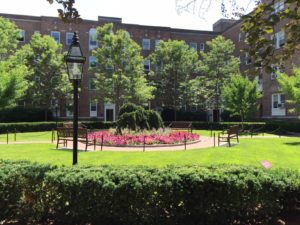Judge says pilot not entitled to uninterrupted sleep at Rye apartment building
Heavy footsteps and grating radiators are not enough of a nuisance to require The Highlands at Rye to return a tenant’s security deposit.
A commercial airline pilot who claimed she needed 10 hours of uninterrupted sleep a night for the safety of her passengers did not prove that the landlord had breached a warranty of habitability, Rye City Court Judge Joseph L. Latwin ruled on Dec. 22.
“Noise from neighbors can conceivably entitle a tenant to a rent abatement,” he noted in citing other legal opinions, but “apartment-house living in a metropolitan area is attended with certain well-known inconveniences and discomforts. The peace and quiet of a rural estate or sylvan silence of a mountain lodge cannot be expected in a multiple dwelling.”

The tenant, who is identified in the judge’s decision only by her last name, Lukic, had tried twice to press her complaint in small claims court. Then she assigned the rights to her security deposit to Glenn B. Allyn and he filed a new small claims case this past July.
Latwin was wary of Allyn’s role in the case, and he discovered that he had been disbarred as an attorney in New York, New Jersey, Connecticut, Pennsylvania and Colorado.
Allyn, of Elmsford, also is a pilot, according to his LinkedIn profile, and has owned, leased sold, and chartered aircraft; brokered airline insurance; and owns a firearms store.
When the small claims case continued, the pilot and now former tenant, Lukic, testified. She claimed she was unable to get 10 hours of uninterrupted sleep because of heavy footsteps from upstairs neighbors and a banging steam radiator.
The heavy footsteps occurred two to three times a month. When the bedroom radiator banged she left the room and slept on a sofa.
Latwin cited a court ruling that found that even the “dull, monotonous, repetitious playing of scales on a piano by a young novice piano student and thumping sounds for a 12-hour period throughout the day did not constitute a nuisance.”
A reasonable tenant would consider the footsteps and radiator noises an “inconvenience incident to communal living,” Latwin said. And anyone living with steam radiators should know that once the radiator heats up the clanging stops.
The pilot also had no reasonable expectation of a noiseless environment, he found, given that the apartment building is across the street from Interstate 95 and the Metro North Railroad tracks and next to an auto body repair shop.
She could have mitigated the sounds of footsteps and radiator by buying earplugs “readily available for less than a dollar.”
Except for being awakened in the night, she did not testify about any detriment to her life, health or safety. Insofar as the risks of her sleeplessness fell on her passengers, “she was duty bound not to fly.”
Allyn, as plaintiff, had to prove liability and damages, Latwin said. But he provided no evidence of a wrongful act by the landlord, did not establish the intensity of the noises, and did not show how the noises were detrimental to the tenant.
Having given the evidence a fair interpretation and evaluating the demeanor and credibility of the witnesses, Latwin said, “the court finds that plaintiff has not proven his claim.”